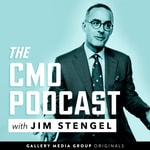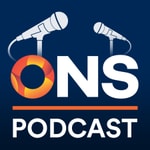Auto Supply Chain Prophets – Détails, épisodes et analyse
Détails du podcast
Informations techniques et générales issues du flux RSS du podcast.

Auto Supply Chain Prophets
QAD and AIAG
Fréquence : 1 épisode/14j. Total Éps: 89

Classements récents
Dernières positions dans les classements Apple Podcasts et Spotify.
Apple Podcasts
🇬🇧 Grande Bretagne - management
29/07/2025#89🇬🇧 Grande Bretagne - management
01/03/2025#83🇨🇦 Canada - management
22/02/2025#84🇨🇦 Canada - management
21/02/2025#49🇨🇦 Canada - management
20/02/2025#30🇬🇧 Grande Bretagne - management
30/12/2024#72
Spotify
Aucun classement récent disponible
Liens partagés entre épisodes et podcasts
Liens présents dans les descriptions d'épisodes et autres podcasts les utilisant également.
See all- https://www.linkedin.com/in/jangriffiths/
32 partages
- https://www.linkedin.com/in/philipideson/
15 partages
Qualité et score du flux RSS
Évaluation technique de la qualité et de la structure du flux RSS.
See allScore global : 78%
Historique des publications
Répartition mensuelle des publications d'épisodes au fil des années.
The Reinvention Mindset for Supply Chain Leaders with Dr. Nadya Zhexembayeva
Saison 3 · Épisode 72
lundi 16 décembre 2024 • Durée 32:20
Is your organization ready to thrive in a world of constant disruption? Dr. Nadya Zhexembayeva, Chief Reinvention Officer and founder of the Reinvention Academy joins Terry Onica and Jan Griffiths on Auto Supply Chain Prophets to explore why reinvention has become the top priority for businesses worldwide.
The days of long business cycles are over. Today, the average lifespan of a business model is down to just five years. With change accelerating across industries, companies can no longer rely on incremental improvements—they must embrace reinvention as an ongoing, proactive process.
But what does reinvention look like? From Philips' shift from consumer electronics to medical imaging to how a Slovenian heating company found its future in the automotive sector, Dr. Nadya's real-world examples reveal how rethinking strengths and opportunities can open new doors.
She also introduces The Titanic Syndrome, her groundbreaking book that draws a parallel between the Titanic's fate and the challenges modern businesses face. With striking examples—from Kodak's demise to startling statistics about Fortune 500 turnover—Dr. Nadya challenges leaders to rethink their approach before their organizations hit their own iceberg.
The real challenge? Culture. To address this, Dr. Nadya offers practical advice for leaders: gather your team for a "75-5 Exercise" that encourages them to rethink long-held assumptions and establish new rules for thriving in today's fast-paced world.
Dr. Nadya's message is clear: Stability is gone, and disruption is here to stay. Leaders must adjust their mindsets and embrace reinvention as a continuous journey. By doing so, they can turn challenges into opportunities and ensure their organizations not only survive but thrive.
Themes discussed in this episode:
- The rapid decline in business model lifespans, from decades to just five years, and what this means for the industry
- Why incremental changes are no longer enough in today’s fast-paced world
- How Philips’ pivot to medical imaging and Hidria’s transition to automotive demonstrate the power of rethinking strengths
- The concept of The Titanic Syndrome and how overconfidence, resistance to change, and lost knowledge are leading businesses to failure
- The cultural transformation needed to embrace continuous reinvention across teams and leadership
- Practical tools like the “75-5 Exercise” to challenge old assumptions and create new strategies for today’s evolving market
- Why leaders must see disruption as the new normal and treat reinvention as an ongoing, proactive process
Featured on this episode:
Name: Dr. Nadya Zhexembayeva
Title: Founder & Chief Reinvention Officer, Reinvention Academy
About: Known as “The Reinvention Guru” and “The Queen of Reinvention,” Dr. Nadya Zhexembayeva is a scientist, entrepreneur, and acclaimed author with expertise in resilience and reinvention. She has guided organizations like the Bill & Melinda Gates Foundation, Coca-Cola, Cisco, L’Oréal, Danone, Henkel, Erste Bank, Danfoss, and Knauf Insulation in transforming their products, leadership strategies, and business models to adapt to shifting market demands and anticipate future disruptions. Nadya has delivered keynotes and workshops to over 500,000 executives, including four TEDx talks. Her award-winning books, along with her contributions to Forbes and Harvard Business Review, further solidify her as a thought leader in
Embracing Ethical AI for Future-Ready Automotive Supply Chains
Saison 3 · Épisode 71
lundi 2 décembre 2024 • Durée 28:01
AI is revolutionizing the automotive supply chain, but how do leaders harness its potential while staying true to ethical principles? In this episode, hosts Terry Onica and Jan Griffiths dive deep into the transformative power of AI with Dr. Charlotte de Brabandt, Head of IT Partner Management at ZF and a global thought leader on ethical AI. Charlotte's impressive career—spanning roles at Porsche, Volkswagen, Johnson & Johnson, and Amazon—gives her a unique perspective on how ethical AI is transforming the industry.
Charlotte introduces ethical AI as the development of systems that prioritize fairness, transparency, and accountability. She explains how addressing challenges such as bias and privacy during development ensures these systems align with ethical standards. This approach, she explains, not only fosters trust with suppliers and partners but also gives businesses a competitive edge.
For supply chain leaders, Charlotte offers practical insights on integrating AI into procurement and supply chain processes. She explains how AI can automate repetitive tasks, optimize decision-making, and strengthen supplier relationships. Through examples from industry leaders like IBM and Unilever, she shares the benefits of adopting ethical AI, from improving efficiency to meeting sustainability goals.
This transformation, however, requires more than just technology—it demands a cultural shift. How do you ensure AI-driven decisions are fair? How do you build a governance framework to guide ethical AI integration? Most importantly, how do leaders move from the outdated command-and-control approach to a collaborative, trust-based supply chain?
Charlotte's message is clear: The time to start embracing AI is now. The future is here, and the companies that embrace ethical AI today will lead the industry tomorrow. Don't miss this deep dive into the future of ethical AI in the automotive industry!
Themes discussed in this episode:
- The role of ethical AI in fostering fairness, transparency, and accountability in the automotive supply chain
- Why addressing bias and privacy concerns is essential to building trust with suppliers and partners
- How ethical AI can streamline repetitive tasks and enhance decision-making in procurement and supply chain processes
- Examples of successful AI integration in companies like IBM and Unilever
- The cultural shift required to move from command-and-control leadership to collaborative, trust-based partnerships
- The importance of establishing governance frameworks to ensure responsible and ethical use of AI
- Why adopting ethical AI now is critical for gaining a competitive edge and preparing for the industry’s future
Featured on this episode:
Name: Dr. Charlotte Anabelle de Brabandt
Title: Head of IT Partner Management (with Procurement) & Deputy Head of IT Governance and Compliance, ZF Group
About: Dr. Charlotte Anabelle de Brabandt is a recognized digital futurist and procurement expert with over a decade of international experience across industries such as automotive, technology, and pharmaceuticals. She’s a published author, TEDx speaker, ISM 30 under 30 Megawatt Winner, a key member of the (ISM®) Thought Leadership Council, Executive Board member of Global Women Procurement Professionals (GWPP), and Advisory Board member of the Global Council for Diversity and Inclusion in Procurement (and Supply Chain). Charlotte is passionate about fostering collaboration, building high-performing teams, and aligning procurement strategies with...
Meet the Software Supplier in 600 Million Vehicles
Saison 3 · Épisode 62
lundi 29 juillet 2024 • Durée 27:15
In this Auto Supply Chain Prophets episode, hosts Terry Onica and Jan Griffiths explore the world of automotive software and technology with their guest, Manoj Karwa, Chief Revenue Officer for the Americas at Elektrobit.
Manoj dives into the exciting world of Software-Defined Vehicles (SDVs) and the advantages of open-source technology. He explains how SDVs, much like smartphones, will continually evolve with new features and improvements over time, enhancing everything from infotainment to safety.
Elektrobit is at the forefront of these innovations, with its software powering over five billion devices across over 600 million vehicles. Manoj highlights Elektrobit's groundbreaking Linux OS solution, the first and only to meet ASIL B/SIL 2 safety requirements. This commitment underscores Elektrobit's dedication to advancing safer and more reliable Software-Defined Vehicles.
The discussion also covers the challenges and importance of validating software to prevent issues like the recent CrowdStrike incident that caused the largest outage in the history of information technology.
When it comes to choosing the right software partners, Manoj believes that opting for the cheapest option can backfire. Instead, he advocates for focusing on value and quality, drawing from his experience in the automotive industry. He notes that as the market becomes more fragmented with new players and technologies, flexibility and a commitment to delivering exceptional value will be key for supply chain leaders.
Manoj concludes the episode with critical advice for leaders in the automotive supply chain: prioritize software above all else. He warns that failing to adapt to this software-driven future could lead to obsolescence, urging leaders to reinvent themselves or be left behind.
This episode is a must-listen for anyone in the auto supply chain looking to understand the future landscape of automotive technology and software's pivotal role in driving innovation and efficiency.
Themes discussed in this episode:
- The role of automotive software in Software-Defined Vehicles and automotive technology
- Understanding the potential benefits of Elektrobit's open-source source approach
- How Software is transforming the automotive sector, including innovation and integration challenges
- Enhancing customer experience through software updates and added functionalities.
- The importance of software validation in ensuring the safety and security of software in vehicles
- Strategies and considerations for managing the supply chain with a focus on software integration.
- Why designing the software before the hardware is essential in today's automotive landscape
Featured on this episode:
Name: Manoj Karwa
Title: Chief Revenue Growth Officer Americas at Elektrobit Automotive Americas Inc.
About: Manoj Karwa, Chief Revenue Growth Officer Americas at Elektrobit Automotive Americas Inc., brings over 20 years of experience in the mobility industry, specializing in electric vehicle infrastructure, electric drive, power electronics, and energy storage systems. He has played key roles in scaling operations and facilitating acquisitions in the EV and renewable energy sectors, including overseeing the deployment of over 10,000 EV charging stations across major automakers and nearly 3,000 dealerships. Before Elektrobit, Manoj held leadership positions at EVBox, Leviton Manufacturing, General Motors, AT Kearney, and Ricardo Consulting and was part of the management team that led to the acquisition of Rhombus Energy Solutions...
Celebrating 6 of 60: Review of the Best Supply Chain Practices from our Podcast
Saison 3 · Épisode 61
lundi 15 juillet 2024 • Durée 28:32
In this special milestone episode of the Auto Supply Chain Prophets podcast, co-hosts Terry Onica and Jan Griffiths celebrate reaching their 60th episode by revisiting six key moments from previous episodes that highlight the core mission of their show: preparing leaders in the auto industry for the future.
First up is TS Tech's innovative approach to MMOG/LE standard implementation. They share how Wendy and Jeff, key figures in MMOG/LE compliance, shed light on the often-overlooked material side of the supply chain.
Next, they explore risk management with insights from Christopher Mattingly, former VP of Transportation for Stellantis, who underscores the critical need for risk management in supply chains, sharing practical advice on contingency planning.
Shifting gears to the EV space, they revisit the comeback story of Volta Truck, an EV startup, showing how important training and alignment are in overcoming challenges in the auto industry.
In another segment, Terry and Jan delve into the enduring relevance of EDI, with Fred Coe likening it to the industry's lifeblood, and touch on the potential of new technologies like APIs. They also discuss QAD's Red Zone in an episode with Kevin Shayer, who explains how implementing the connected workforce solution boosted their company's productivity and engagement.
The final highlight is the episode with Mike Payoink, whose passion for moving beyond spreadsheets to a standardized, automated process across different plants demonstrates the significant benefits of real-time visibility and collaboration in managing quality and supplier issues.
In a captivating wrap-up, they identify five key success factors drawn from their extensive podcast journey, offering listeners actionable advice for navigating the future of the auto supply chain.
Themes discussed in this episode:
- The importance of implementing the Materials Management Operations Guideline (MMOG/LE) and overcoming compliance challenges
- The necessity of effective risk management and contingency planning in supply chains
- The role of teamwork and education in achieving compliance and operational success
- Exploring the EV space with insights on an EV startup’s recovery strategies
- The importance of comprehensive training and cross-functional collaboration in the automotive industry
- Understanding the enduring significance of EDI in the automotive supply chain
- Identifying and reinforcing the key success factors that contribute to success in the automotive supply chain
Featured on this episode:
Name: Terry Onica
Title: Director, Automotive at QAD
About: For two decades, Terry has been the automotive vertical director of this provider of manufacturing Enterprise Resource Planning software and supply chain solutions. Her career began in supply chain in the late 1980s when she led a team to implement Electronic Data Interchange for all the Ford assembly and component plants.
Connect: LinkedIn
Name: Jan Griffiths
Title: President and Founder, Gravitas Detroit
About: Jan is the architect of cultural change in the automotive industry. As the President and...
The Route to Success: Understanding Transportation Dynamics in Supply Chain Management
Saison 3 · Épisode 60
lundi 1 juillet 2024 • Durée 29:02
In this episode of the Auto Supply Chain Prophets podcast, hosts Terry Onica and Jan Griffiths interview Christopher Mattingly, a seasoned veteran of over 40 years in the automotive industry. Being a retired Vice President of Transportation at Stellantis, Christoper is here to talk about the dynamics of the transportation aspect of automotive supply chain management.
Christopher begins by sharing an important milestone in his professional journey: his time as a production supervisor at the Warren Truck Assembly Plant. He reflects on how industry leader Dick Dauch helped shape his career and inspired him to climb the corporate ladder.
With experience in nearly every aspect of the supply chain, Christopher shares his thoughts on where the automotive supply chain should focus today: end-to-end visibility and schedule stability. He outlines his vision of a perfect supply chain and discusses potential solutions that would make the supply chain world a lot easier to deal with.
"There's no better way than communication," says Christopher. To answer Terry's question on enabling better collaboration, Christopher suggests that no department should be left to solve its problems; instead, we should all work together and strive to advance the company's overall objectives.
Regarding his transportation role, Christopher discusses the number one issue the transportation world faces today: capacity and the need to develop cost-effective solutions. He shares some of the disruptions he encountered in his career and the solutions they have applied, providing valuable insights into navigating the transportation aspect of supply chain management.
In light of the massive transformation in the automotive industry, Christopher said that leaders must embrace the mindset of contingency planning, echoing the phrase, "Only the paranoid survive." He stresses that while it's challenging and requires discipline and collaboration, investing in robust contingency plans is crucial for leaders to navigate inevitable issues in the industry's transformation.
Themes discussed in this episode:
- Lessons learned from decades of experience in automotive supply chain management
- The current challenges faced by automotive supply chains today
- The importance of end-to-end visibility and schedule stability in supply chain operations
- Challenges in the transportation world relating to capacity
- Technology's impact on supply chain management, particularly in tracking and alarm systems
- Improving communication and collaboration across departments to address issues effectively
- The need to invest in robust contingency plans to help leaders anticipate and mitigate disruptions
Featured on this episode:
Name: Christopher Mattingly
Title: Retired Vice President of Transportation at Stellantis North America
About: Christopher Mattingly is a seasoned automotive industry expert with over 40 years of experience. A Wayne State grad, he started as a production supervisor at the Warren Truck Assembly Plant in the 1980s and retired as Vice President of Transportation at Stellantis. With a diverse background in Supply Chain Management, Christopher excels in Logistics, Procurement, Supplier Quality, and more. Known for his dedication, leadership, and problem-solving skills, he has consistently driven operational improvements and new product launches. Passionate about mentoring and motivating his teams, Christopher is respected across all levels of the industry.
Connect:
Inside Global Trade, Compliance, and Logistics
Saison 3 · Épisode 59
lundi 17 juin 2024 • Durée 26:20
In this episode of the Auto Supply Chain Prophets Podcast, hosts Terry Onica and Jan Griffiths dive into the complexities of global trade, compliance, and logistics with their guest, Jeff Peterson, Director of Global Trade and Logistics at DRiV, a Tenneco company.
Jeff digs into the challenges facing the trade compliance industry today. He highlights the ocean shipping container shortage, which has led to increased costs and delays. He also addresses other disruptions, such as port backups and global trade policies, which compound the complexities faced by professionals in the field.
According to Jeff, staying informed through reliable 3PLs and brokers and leveraging technology and software applications is crucial in dealing with these issues.
Jeff Peterson explains that they handle customs audits by focusing on security and compliance. They take a proactive "shift left" approach, doing necessary work upfront to avoid audits. Their comprehensive strategy helps mitigate risks to both business and national security.
Talking about the challenges at the US-Mexico border, Jeff explains that security is the main focus. They use the CTPAT and FAST programs to facilitate smoother border crossings, similar to a TSA pre-check for cargo. These security measures help ensure efficient movement across the border.
Jeff's passion for people development shines through as he discusses his strategies for talent growth. He believes in creating comprehensive programs that offer career paths, hands-on experiences, and continuous learning opportunities.
When it comes to future-proofing the industry, Jeff advises Tier One and Tier Two leaders to focus on the people aspect of the business first, have an action plan, maintain pristine data, and be ready to pivot as necessary. He believes that while technology is vital, it's the dedication and expertise of individuals that truly drive success.
Themes discussed in this episode:
- The ongoing ocean shipping container shortage, predicting higher costs and delays due to global disruptions
- The need for staying updated through reliable 3PLs and brokers to manage unexpected global trade issues
- The use of predictive logistics software to manage supply chain risks and ensure timely deliveries
- Placing customs and compliance within the supply chain rather than in finance or legal departments for better integration
- The importance of breaking down organizational silos to ensure smooth operations and proactive risk management
- How trade wars and the COVID-19 pandemic have brought supply chain management into the public eye
- Managing security and compliance at the US-Mexico border through programs like CTPAT and FAST
- The role of technology and software in maintaining compliance and streamlining logistics processes
Featured on this episode:
Name: Jeffrey Peterson
Title: Director, Global Trade and Logistics CI, DRiV Inc. – a Tenneco company.
About: Jeff Peterson is a seasoned professional specializing in global trade and logistics. Currently serving as Director of Global Trade and Logistics CI at Tenneco, Jeff has extensive experience managing various functions, including Client Management, Reconciliation, Restricted Party Screening, and Export Operations, during his tenure at Livingston International. He has also led the Graduate Rotation and Development Program,
Collaborative Excellence: Merging Quality and Supply Chain
Saison 3 · Épisode 58
lundi 3 juin 2024 • Durée 25:18
In this episode of the Auto Supply Chain Prophets podcast, co-hosts Terry Onica and Jan Griffiths welcome Steve Povenz, a recognized leader in automotive quality, to discuss the crucial integration of quality and supply chain functions.
Steve believes quality and supply chain are inseparable and fundamental to an organization's success. He points out that many organizations fail because these functions operate in silos, leading to inefficiencies and missed opportunities for improvement.
He stresses that quality should be proactive and collaborative, engaging with other departments to understand and mitigate issues before they arise.
Steve highlights the importance of regular cross-functional reviews and the use of technology to bridge gaps, streamline processes, and enhance data accuracy. He praises Terry and Cathy Fisher's 24 Essential Supply Chain Processes as a comprehensive roadmap for improving these integrations.
Jan and Steve discuss the impact of leadership and culture in fostering collaboration between quality and supply chains. Steve says effective leadership and shared goals lead to successful outcomes regardless of organizational structure.
They touch upon the need for evolving standards like IATF 16949 to keep pace with industry changes, particularly the shift from internal combustion engines to electric vehicles.
Steve encourages quality professionals to engage with AIAG, participate in summits, and provide feedback to help shape the future of automotive quality standards.
The episode concludes with Steve's practical advice for leaders in the automotive supply chain: engage with quality counterparts, involve them in daily operations, and leverage their expertise to solve problems collaboratively.
Themes discussed in this episode:
- The importance of integrating quality and supply chain functions within organizations
- The issue of quality and supply chain functions operating in silos and the negative impact of this separation
- Leadership's role in fostering collaboration between quality and supply chain functions
- How technology can automate processes, enhance data collection, and improve overall efficiency within quality and supply chain operations
- The use of performance scorecards, such as those mandated by IATF 16949, to measure and manage quality and delivery performance within the supply chain
- The potential benefits of leveraging frameworks like the 24 Essential Supply Chain Processes to align quality and supply chain operations
- Why quality and supply chain functions need to adapt to rapid changes in the automotive industry, particularly with the shift from ICE to BEV
- How to achieve continuous improvement through the use of technology, better integration of functions, and proactive identification and resolution of pain points within the supply chain
Featured on this episode:
Name: Steve Povenz
Title: Visionary Global Quality Leader, Director of Quality at Shape Corp.
About: Steve is a visionary global quality leader with extensive expertise in Quality Management Systems (QMS) and project management. As the Director of Quality at Shape Corp. for 18 years, he has driven significant improvements in customer satisfaction, cost reduction, and quality standards. Steve excels in fostering organizational growth, creating an empowered employee experience, and enhancing stakeholder engagement. His multicultural
AutoCulture 2.0: Shifting Leadership and Culture in the Auto Supply Chain
Saison 3 · Épisode 57
lundi 20 mai 2024 • Durée 25:12
In this episode of the Auto Supply Chain Prophets podcast, hosts Terry Onica and Jan Griffiths switch things up as Terry interviews Jan about her new book, AutoCulture 2.0. The conversation starts with Jan sharing the intense yet fulfilling journey of launching her book, which has already reached number one in Amazon's leadership category.
Jan explains that her book is designed to drive a much-needed cultural shift in the auto industry. She stresses that while the industry is buzzing with technological transformations like EV adoption and smart cities, the focus must also be on evolving leadership and culture to match this rapid change.
Terry and Jan delve into the importance of effective communication and stakeholder buy-in for successful change initiatives. They highlight how a collaborative approach, rather than a command-and-control style, can drive better results and innovation within the supply chain.
The discussion also touches on personal stories that shaped their leadership styles. Jan shares how her father's farming background and pub negotiations subtly taught her invaluable leadership and negotiation skills. Terry recalls the lessons her father imparted, emphasizing the profound impact fathers can have on their daughters' careers.
The episode wraps up with Jan advising listeners to reflect on their own leadership identity and values. She encourages leaders to be clear and intentional about who they are, which will, in turn, help inspire and guide their teams more effectively.
Themes discussed in this episode:
- The crucial role of education in preparing students for the automotive industry
- Utilizing technology such as ERP systems and digital tools for effective supply chain management
- The necessity of continuous improvement and optimization in supply chain processes
- The need for new leadership models and workplace culture to handle the automotive industry's rapid transformation
- How many change initiatives fail due to poor leadership and lack of stakeholder buy-in
- The importance of collaboration and communication within the supply chain
- The effectiveness and drawbacks of the traditional command-and-control leadership style
- Family influence on personal and professional development
- Why self-awareness is important for effective leadership
Featured on this episode:
Name: Jan Griffiths
Title: President and Founder, Gravitas Detroit
About: Jan is the architect of cultural change in the automotive industry. As the President & Founder of Gravitas Detroit, Jan brings a wealth of expertise and a passion for transforming company cultures. Additionally, she is the host of the Automotive Leaders Podcast, where she shares insightful conversations with industry visionaries. Jan is also the author of AutoCulture 2.0, a groundbreaking book that challenges the traditional leadership model prevalent in the automotive world. With her extensive experience and commitment to fostering positive change, Jan is at the forefront of revolutionizing the automotive landscape.
Connect: LinkedIn
Mentioned in this...
Lessons Learned in a CPO's Transition from Auto to Life Sciences
Saison 3 · Épisode 56
lundi 6 mai 2024 • Durée 20:40
In the latest episode of the Auto Supply Chain Profits podcast, hosts Terry Onica and Jan Griffiths interview Carrie Uhl, who is the Chief Procurement Officer at Danaher Corporation. Carrie shares her extensive knowledge and experience in the automotive and healthcare industries, helping to bridge the gap between these two seemingly different sectors.
Carrie's journey from Magna to GE Healthcare and now Danaher shows how versatile supply chain expertise can be. Despite the differences in products, the core challenges remain consistent—such as security of supply, cost reduction, talent acquisition, and digitalization.
Technology plays a significant role in both industries. Carrie talks about how it enables communication and process adoption and facilitates lean manufacturing. She emphasizes the importance of supply chain technology for enhanced visibility and effective risk management strategies.
Carrie highlights the collaboration between the automotive and healthcare industries during the COVID-19 pandemic in the rapid production of ventilators. Showcasing how different sectors can come together to support each other in times of crisis.
The episode covers topics such as supply chain resiliency, supplier relationship management, and early supplier involvement in product development. It addresses the need for the automotive industry to recognize suppliers as essential partners rather than adversaries.
In the end, Carrie calls upon automotive leaders to prioritize supplier segmentation and proactively engage with key suppliers to leverage their expertise.
Themes discussed in this episode:
- The need for professionals to adapt to industry transitions and leverage transferable skills
- Exploring the differences and similarities between the automotive and healthcare industries
- The importance of leveraging technology, such as ERP systems and digital tools, in supply chain management
- Strategies for enhancing supply chain resilience and effectively managing risks
- The value of proactive engagement with suppliers and early involvement in product development processes
- Why continuous improvement and optimization are essential for supply chain processes
- Moving away from treating suppliers as adversaries to building partnerships focused on mutual success
Featured on this episode:
Name: Carrie Uhl
Title: Chief Procurement Officer at Danaher Corporation
About: Carrie is the Chief Procurement Officer at Danaher Corporation, where she spearheads initiatives to enhance quality, cost efficiency, and supply continuity. With a background encompassing leadership roles at GE Healthcare and Magna International, Carrie brings a wealth of experience in procurement and supply chain management to her current position. Recognized for her contributions to the automotive industry, she was named one of the 100 Leading Women by Automotive News and featured in Procurement Magazine's Top 100 CPO list.
Connect: LinkedIn
Mentioned in this...
Start Your Sustainability and Profitability Journey with Our New E-book
Saison 3 · Épisode 55
lundi 22 avril 2024 • Durée 20:52
In this episode of the Auto Supply Chain Prophets podcast, hosts Terry Onica and Jan Griffiths are joined by Cathy Fisher and Alexis Scipio to talk about their new eBook called "Delivering on the Promise of Delivering: Automotive Sustainability and Profitability."
Discover why ESG is becoming increasingly important in the automotive industry and why you should care. Alexis explains how sustainability can lead to profitability and what benefits companies get from having solid sustainability strategies.
We'll explore how ESG is now part of industry standards like MMOG/LE and quality management systems. Organizations must now consider their environmental impact and align their operations with sustainability objectives, a shift that Terry, Cathy, and Alexis aim to support through their upcoming eBook.
Terry talks about the crucial role of technology in supporting ESG initiatives, citing examples such as supplier relationship management tools and ERP systems. Cathy explains how ESG relates to the 24 Essential Supply Chain Processes, which could help organizations integrate ESG into their operations.
Their combined expertise in ESG, quality management systems, and supply chain management led to an eBook that simplifies complicated regulations into a digestible format. It's a lifesaver for leaders industry leaders who are overwhelmed by the task of navigating numerous regulations.
The episode concludes with advice encouraging listeners to embrace ESG proactively. It reminds us that ESG is not a passing trend but a fundamental aspect of automotive operations that requires immediate attention and action.
Themes discussed in this episode:
- How supply chain, quality, and ESG intersect in the automotive industry
- ESG’s growing importance in the automotive industry
- How sustainability can lead to profitability
- The relationship between ESG and industry standards such as MMOG/LE
- Why we should focus on implementing ESG practices
- The role of technology in supporting ESG initiatives
- The overwhelming complexity of ESG requirements
Featured on this episode:
Name: Alexis Scipio
Title: Founder, The Thrive Point
About: Alexis Scipio is a seasoned ESG aficionado and supply chain professional with over 15 years of experience in the automotive industry. She’s the Founder of The Thrive Point LLC. and a certified diversity specialist who passionately integrates Environmental, Social, and Governance (ESG) principles into business processes.
Connect: LinkedIn
Name: Cathy Fisher
Title: Founder and President, Quistem
About: As Quistem's driving force, Cathy helps its clients, particularly automotive manufacturers, eliminate customer complaints and increase their profits. She has worked in the automotive supply chain since the 1980s when she started her career with General Motors.
Connect: LinkedIn
Mentioned in this episode:









